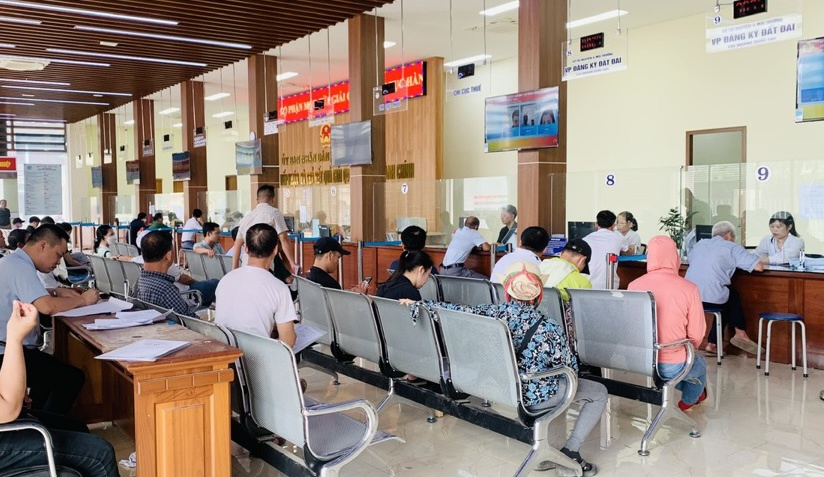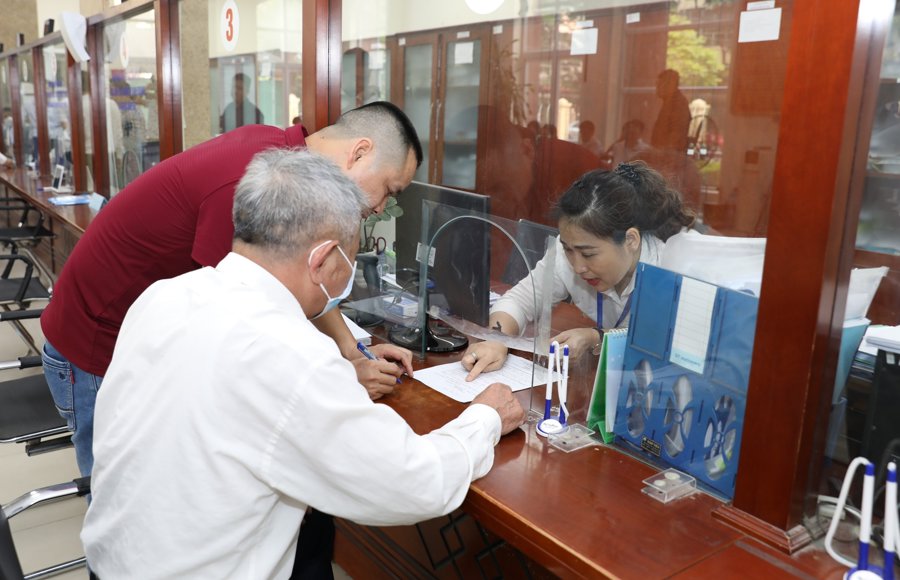PUBLIC SERVICES

The center will simplify administrative procedures, reduce the number of required documents, and minimize the steps involved in processing and resolving these procedures.
On September 17, the Hanoi People's Committee submitted Document No. 333/TTr-UBND to the Hanoi City Council for approval of the pilot project and establishment of the Hanoi Administrative Service Center.

Locals waiting to apply for public services.
According to the Hanoi People's Committee, the goal of establishing the Hanoi Administrative Service Center is to operate based on an information system for processing administrative procedures connected to the National Public Service Portal, national databases, specialized databases, and common platform systems.
The center aims to handle administrative procedures without geographic restrictions, reduce the number of “one-stop” departments, and innovate the process of receiving administrative procedures. This will ensure that every citizen can access public services within a 30-minute travel radius or a maximum of 5 kilometers, with services available 24/7 (from the location of citizens and businesses to the administrative service point). The center will also enhance the effectiveness of controlling administrative procedures, monitoring and supervising their implementation, and supporting the leadership of the Hanoi People's Committee in managing and directing administrative tasks. It will meet digital transformation targets and improve administrative procedure reforms and online public services.
Additionally, all online public services will be redesigned and streamlined. The center will simplify administrative procedures, reduce the number of required documents, and minimize the steps involved in processing and resolving these procedures.
The center will effectively digitize records, reuse digitalized documents, and archive resolved administrative procedures (with 100% of documents being digitized before processing and 100% of successfully resolved documents being stored and reusable). It will establish an electronic data management repository for organizations and individuals and connect with the National Public Service Portal.
Furthermore, the center will enhance professionalism and independence in receiving, digitizing, and handling administrative procedures. It will ensure flexibility in staff allocation, transfer some administrative tasks and services to businesses and social organizations where state intervention is not necessary, and aim for a service satisfaction rate of at least 95%. All administrative procedures will be publicly accessible and transparent. The center’s operations will focus on citizens and businesses, with their satisfaction being the measure of quality and effectiveness. It will not replace the functions or responsibilities of other departments, agencies, or units but will improve coordination and avoid duplication of tasks.
Information technology will be a key tool, with digital transformation as the main method for implementing the “new one-stop shop” model. The entire process of receiving, digitizing, processing, resolving, and reporting on administrative procedures will be conducted transparently, clearly identifying responsibilities and timelines, and fully digitalized.
The city will comprehensively improve the one-stop shop model, building on previous achievements and adapting flexibly to practical requirements. Emphasis will be placed on high-quality human resources training, with special policies to attract and develop experts and scientists for the center.
Notably, Hanoi will ensure the reception of administrative procedures beyond geographic boundaries, with services accessible within a 30-minute travel radius or 5 kilometers, providing 24/7 support online, and direct transaction times not exceeding 15 minutes per case. The Hanoi Administrative Service Center will be an administrative agency under the Hanoi People's Committee, with legal status, its own seal and account. It will adhere to the management and direction of the Hanoi People's Committee and follow the guidance of the Government Office. The main office of the center is planned to be located at 197 Nghi Tam Street, Yen Phu Ward, Tay Ho District.

Public officials help citizens apply for public services.
Administrative procedures will be managed across 30 branches (one-stop departments in 30 districts, towns, and cities), not at the main office. The centers will be flexibly located based on practical conditions and population density, with a focus on online transactions, forming an Administrative Service Center in the digital space.
Enhancing public satisfaction
The center will manage state control over administrative procedures, implement "one-stop" and "one-stop integrated" mechanisms, and reform administrative procedures. It will serve as the primary body for providing information, guidance, support, reception, digitization, coordination, resolution (where applicable), and results delivery for administrative procedures. It will also handle IT application, digital transformation tasks, and internal management of the center, along with other duties assigned by the Hanoi People's Committee or mandated by law.
The pilot implementation of the center will follow a "decisive reform - cautious deployment - feasible and practical" approach with the primary goal of serving citizens and businesses. It will proceed in three phases: Phase 1 from October 1, 2024, to March 31, 2025 (a key and decisive phase); Phase 2 from April 1, 2025, to June 30, 2025; and Phase 3 from July 1, 2025, onward.
Following the Hanoi City Council's decision, the Hanoi People's Committee will issue a decision detailing the organizational structure and functions of the Administrative Service Center, expected in October 2024.
Impact assessments predict a significant increase in productivity through enhanced IT use and the socialization of some administrative tasks. The average number of cases handled by one staff member at a one-stop shop per year is projected to reach a minimum of 1,800 in urban areas, 1,200 in rural areas, and 800 in remote or particularly difficult areas. The average waiting time for organizations and individuals will be reduced to a maximum of 15 minutes per transaction, and the processing time for each case is expected to be no less than 30 minutes by 2025.
Ngoc Mai